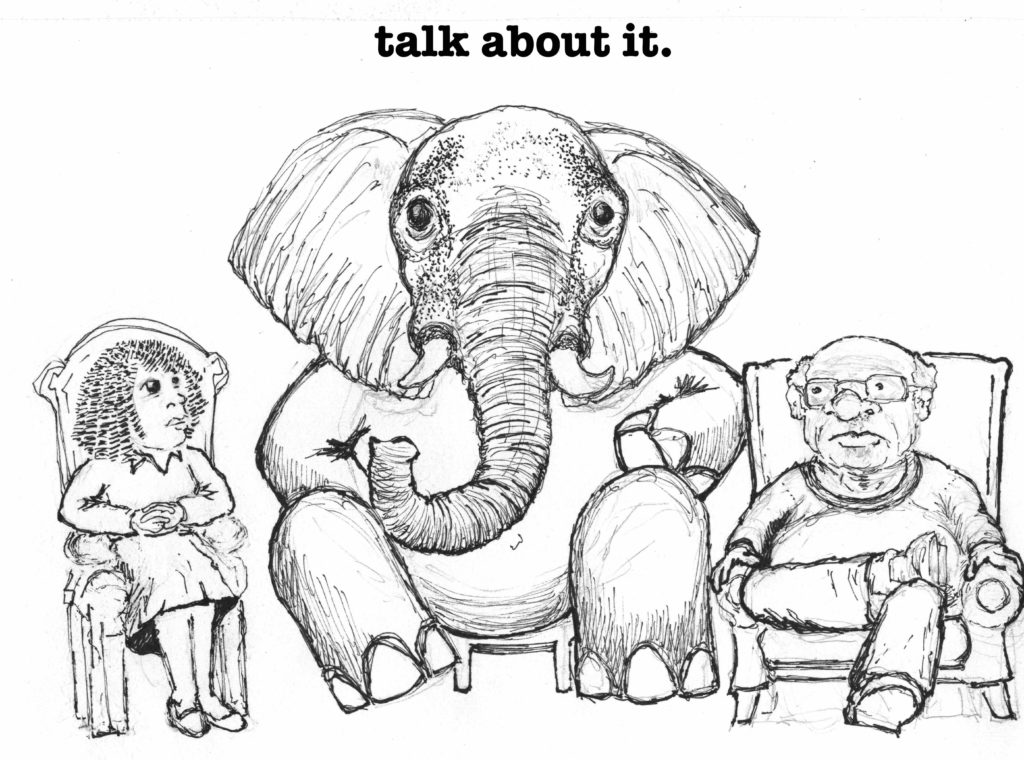by Lucia Jander, M.D., Medical Director at Hospicare & Palliative Care Services

End-of-life. Dying. Death. These words make people so uncomfortable that they often soften them. We talk about loved ones who “passed away,” or “lost a battle,” or “went to heaven.”
There are many reasons to view COVID-19 as a dark time for our community and our world. It is. If there is a silver lining to a pandemic, it is that it makes people confront their own mortality, to think about their wishes, and – I hope – to become a little more comfortable with death as a part of life. This is a good time to open the door to those conversations with loved ones.
In hospice, every patient and family works with staff to develop a personalized care plan. Each patient shares with us their preferences for physical, emotional, social, and spiritual care. Some patients may desire music therapy; others may want help making amends with their family. Just as every person is unique, there is no “one size fits all” approach to end-of-life care.
How do you imagine your end-of-life experience? What medical or life-sustaining care do you want?
Who are the family and friends who will be most impacted by your death?
What do you want your legacy to be?
You don’t need to be sick or in crisis to have these conversations. My advice to my patients is to start with yourself. Spend time thinking about your desires, and what you want to articulate to your loved ones. Think of this process as creating peace of mind for yourself and a gift to the people who love you most.
Once you have your own thoughts together, here are some resources to get started:
Having the Conversation

Although end-of-life planning is critical for adults at every age, it can be difficult to find a way to introduce the topic of conversation to your loved ones.
Try to remember that by having the dialogue, you are doing your loved ones a favor because they won’t have to guess your wishes.
A Living Will is a legal document, that you can provide to your loved ones and your health care proxy to explain your decisions about your end of life. A document like “5 Wishes” can help you think about medical, emotional and spiritual questions, providing a structure for you to reflect on these issues and start the conversation with your health care proxy, other medical providers, and your family.
Medical Decisions
A Health Care Proxy is a legal document designates a person who will make health care decisions only if you are unable to make them yourself. Because it is difficult to know all the choices that will need to be made, it is important to appoint someone you trust and who knows your core values. Be sure that every one of your medical providers has a copy of this proxy, keep a copy at home, and send a copy to your attorney, if you have one. It’s also a good idea to think about naming an alternate proxy, in the event your primary proxy can’t perform their duties; make sure both individuals are unified around you and your expressed desires.
A Medical Orders for Life Sustaining Treatment (MOLST) form outlines your wishes for the end of life in the event you cannot make this decision yourself. If you do not have a Health Care Proxy, this document will guide medical decisions. If you do have a Health Care Proxy, this document can guide their choices on your behalf.
A Do Not Resuscitate Order (DNR) determines what life sustaining measures, if any, you would like if your heart has stopped beating and you are not breathing. While a DNR can stand alone, it is also a part of the more comprehensive MOLST form.
Financial Decisions
A Durable Power of Attorney names someone to make financial decisions when you can no longer do so. If finances are complicated or there are exceptions to the use of your money, this document can be drawn up by a lawyer.
A will indicates how your assets and estate will be distributed upon death. The person you name within your will as the executor is responsible for ensuring your wishes are met. Your will may also specify arrangements for care of minors, gifts to loved ones or favorite charities, and funeral and/or burial arrangements
A living trust provides instructions about the person’s estate and appoints someone, called the trustee, to hold title to property and funds for the beneficiaries. A living trust can provide a detailed plan for property disposition.
Other Considerations
If you’d like to be an organ donor, you can fill out an organ donation card and carry it in your wallet. In New York State, you can also have this choice listed on your driver’s license by contacting the DMV.
Put together important documents and information so that they are easy to access in a time of stress or uncertainty. Among items to consider putting together in a safe place, ideally in a fireproof box:
- bank account numbers, both checking and savings
- insurance policies
- investment account details
- safe deposit box keys
- Social security card and other identification like birth certificates and passports
- Utility and other monthly billing information
- mortgage, deed, or lease for your home or residence
- vehicle title
- Internet account numbers and passwords, including subscriptions and email accounts
- Important phone numbers for family members, your lawyer, doctor, and financial planner, pastor or priest, and your preferred funeral home.
***
Dying is not something we can – or should soften. Death is a part of life, and planning for it can make all the difference to the emotional health of those you leave behind.
If you need help connecting to resources, or ideas for how to start this process for yourself, please contact us at Hospicare. We are here to support residents of Cortland and Tompkins counties, and we speak to individuals and groups about the importance of end-of-life planning. Our goal is always to make your wishes are expressed and respected, so email info@hospicare.org or call 607-272-0212 with any questions.
***
Talk About it Artwork by Scott Brown.